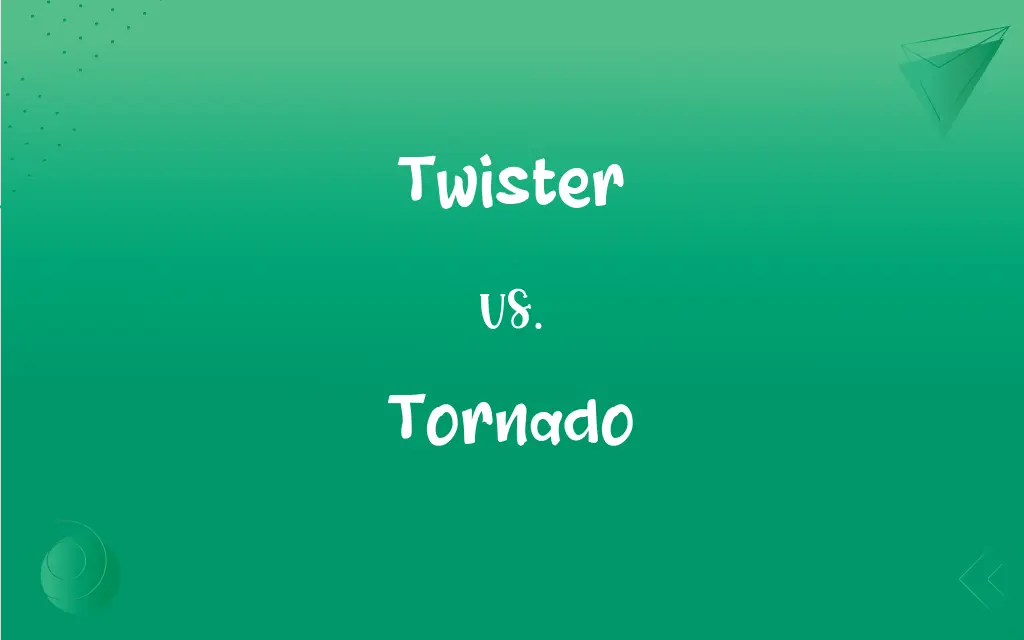Twister vs. Tornado: What's the Difference?
Edited by Aimie Carlson || By Harlon Moss || Updated on May 30, 2024
A twister and a tornado both refer to a violent windstorm characterized by a twisting, funnel-shaped cloud; essentially, they are synonymous terms.

Key Differences
Twister and tornado both describe a violent and destructive windstorm, specifically one that exhibits a rotating column of air which extends from a thunderstorm to the ground. The primary difference between the two terms isn't their definition, but their usage. While "tornado" is a more scientific and official term, "twister" is more colloquial and often used in casual conversation.
Both twister and tornado are known for their funnel-shaped clouds and the destruction they can cause when they touch down on land. They are categorized based on the Enhanced Fujita scale in the U.S., ranging from EF0 (weakest) to EF5 (strongest). While meteorologists and researchers predominantly use the term "tornado" in their studies and reports, the word "twister" might be more commonly heard in popular media and everyday speech.
It's crucial to understand that despite the difference in terminology, both words describe the same natural phenomenon. In areas prone to these windstorms, such as Tornado Alley in the U.S., residents might interchangeably use twister and tornado when discussing or recalling such events. However, for clarity and consistency, especially in official contexts like weather forecasting, "tornado" is the preferred term.
The usage of twister versus tornado might vary based on regional preferences or cultural contexts. While both words are recognized and understood globally, one might be favored over the other in specific areas or communities. Regardless of the term used, the importance lies in understanding the potential danger and taking necessary precautions when either a twister or tornado is forecasted.
Comparison Chart
Definition
A violent windstorm with a twisting motion
A rotating column of air from storm to ground
ADVERTISEMENT
Usage
Casual
More scientific, official
Context
Common in everyday speech, popular media
Preferred in research, weather forecasting
Regional Preference
Might be favored in specific areas
Universally recognized and used
Danger Level
Same as tornado
Same as twister
Twister and Tornado Definitions
Twister
A violent windstorm characterized by a twisting, funnel-shaped cloud.
The twister left a path of destruction through the town.
ADVERTISEMENT
Tornado
A meteorological phenomenon categorized on the Enhanced Fujita scale.
The tornado was rated as an EF3 based on the damage assessment.
Twister
A colloquial term for a tornado.
People took shelter when they heard a twister was approaching.
Tornado
A vortex related to supercell thunderstorms.
The tornado's path was evident by the flattened houses and uprooted trees.
Twister
A vortex phenomenon related to severe thunderstorms.
The dark sky hinted at the possibility of a twister.
Tornado
A term used officially in weather forecasting and storm tracking.
The weather service issued a tornado watch for the region.
Twister
A rotating column of air extending from a storm to the ground.
The twister picked up debris as it moved across the field.
Tornado
A violent and rotating column of air touching the ground from a thunderstorm.
The tornado warning prompted everyone to find a safe place.
Twister
A term often used in media and films to describe tornadoes.
The movie Twister showcased the thrill of storm chasing.
Tornado
A windstorm often accompanied by a funnel-shaped cloud causing destruction.
The town was devastated by the powerful tornado.
Twister
One that twists, as in the manufacture of rope or yarn.
Tornado
A violently rotating column of air extending from a cumulonimbus cloud to the ground, ranging in width from a few meters to more than a kilometer, with destructive winds up to 510 kilometers (316 miles) per hour or higher. Tornadoes are typically associated with a funnel cloud pendant from a storm's wall cloud, often extending to the bottom of the tornado.
Twister
(Sports) A ball thrown or batted with a twist.
FAQs
Why might someone use "twister" instead of "tornado"?
"Twister" is more colloquial and might be used in casual conversation or media.
Which is stronger, a twister or a tornado?
They are synonymous, so their strength is equivalent.
Are twister and tornado the same thing?
Yes, they both refer to the same violent windstorm phenomenon.
What causes the formation of a tornado or twister?
They often form from the updrafts in supercell thunderstorms under specific conditions.
Can "twister" be used in a weather forecast?
While understood, "tornado" is the preferred term in weather forecasting.
Is "twister" used outside of the U.S.?
While recognized globally, regional preferences might favor "tornado" over "twister."
Which term is more scientifically accepted?
"Tornado" is the more scientific and official term.
Can a twister form over water?
Yes, when it forms over water, it's commonly called a waterspout.
Which regions experience the most tornadoes or twisters?
Tornado Alley in the U.S. is especially prone to these windstorms.
Can twisters form without thunderstorms?
Tornadoes typically form from severe thunderstorms, especially supercells.
How fast can a tornado or twister travel?
Their forward speed can vary, but they typically move at 20-40 mph, though some can be faster.
Which term is older: twister or tornado?
Both terms have deep historical roots, but "tornado" is derived from older Spanish and Latin words.
Is there a movie titled "Tornado"?
While there may be movies with that title, the most famous one is "Twister."
Do twisters always touch the ground?
No, if they don't touch the ground, they're called funnel clouds.
How long can a tornado or twister last?
Most last less than 10 minutes, but some can persist for over an hour.
How are tornadoes or twisters rated?
They are categorized based on the Enhanced Fujita scale from EF0 to EF5.
Is a cyclone the same as a tornado or twister?
No, a cyclone is a larger meteorological system, while a tornado/twister is a specific vortex phenomenon.
Are there safety guidelines for tornadoes and twisters?
Yes, it's essential to seek shelter, preferably in a basement or an interior room on the lowest floor.
Can you outdrive a twister or tornado?
It's risky. The safest action is to find shelter rather than trying to outdrive it.
Are twisters always visible?
No, some tornadoes can be rain-wrapped or obscured by debris.
About Author
Written by
Harlon MossHarlon is a seasoned quality moderator and accomplished content writer for Difference Wiki. An alumnus of the prestigious University of California, he earned his degree in Computer Science. Leveraging his academic background, Harlon brings a meticulous and informed perspective to his work, ensuring content accuracy and excellence.
Edited by
Aimie CarlsonAimie Carlson, holding a master's degree in English literature, is a fervent English language enthusiast. She lends her writing talents to Difference Wiki, a prominent website that specializes in comparisons, offering readers insightful analyses that both captivate and inform.






























































